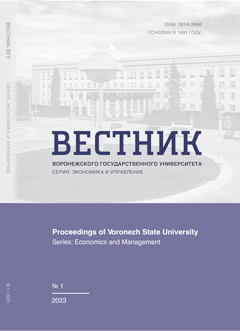Современные подходы к повышению эффективности управления талантами в сложно-структурированной организации
Аннотация
Предмет. В данной статье рассматривается проблема совершенствования системы управления талантами с точки зрения повышения ее эффективности. Представлен теоретический обзор работ по теме исследования природы таланта в контексте поиска эффективных форм организационного управления талантами в сложно-структурированной организации.
Цель. Описать методы оценки эффективности управления талантами в сложно-структурированных организациях, выявить их преимущества и недостатки.
Методология. В исследовании применены метод ассессмент-центр для оценки влияния показателей талантов на конечные финансовые результаты организации, сбалансированный метод оценки эффективности управления талантами. В большинстве организаций со сложной структурой направление развития профессиональных компетенций талантов не выделяются в отдельные программы, что нивелирует возможность системного подхода к её осуществлению. Другой проблемой является то, что в сложно-структурированных организациях отсутствует система методов ранжирования талантов по результативности их работы, что значительно облегчило бы оценку их деятельности. Несоответствие теории и практики обуславливает необходимость разработки методики оценки результатов деятельности талантов и их трудового вклада в реализацию стратегии по улучшению финансово-экономических показателей сложно-структурированной организации.
Выводы. Процесс управления талантами в сложно-структурированной организации будет эффективным благодаря применению адаптированного проектно-процессного метода, суть которого заключается в создании индивидуальных «карт результативности и эффективности» оценки деятельности талантливых сотрудников, что в итоге повлияет как на повышение их мотивации, так и на рост финансово-экономических показателей организации. Данная методика учитывает каждый реализованный проект, выделяя в итоговом отчете как понесенные расходы, связанные с участием таланта в нем, так и прибыль, полученную по результатам его деятельности.
Литература
Artemyeva, E. N. (2016) [Mentor 2.0: nine key competencies]. Vestnik Universiteta Talantov. 3, 67–69. (In Russian).
Bystrova, M.V. & Shreider, N.V. (2019) [Talent management as a model of human capital management]. Alleya nauki. 5 (28), 597–605. (In Russian).
Durakova, I. B. (2009) Personnel management: specifics of international development trend. Proceedings of Voronezh State University. Series: Economics and Management. 1, 46–52. (In Russian)
Zaripova, T. Yu. & Tuktamysheva, S. V. (2017) [Assessment and development systems for "breakthrough competencies": world and domestic experience]. Bulletin of the University of Talents. 1, 38–46. (In Russian).
Kabalina, V. I. & Mondrus, O. V. (2018) [Contextualization of talent management in Russian IT companies]. Rossiyskiy zhurnal menedzhmenta. 16 (1), 5–36. (In Russian).
Kabalina, V. I. & Mondrus, O. V. (2017) Factors of talent management in a company: A contextual approach. Vestnik of Saint Petersburg University. Management. 16 (2), 268–298 (In Russian)
Kupriyanovskiy, V. P. et al. (2017) [Skills in the digital economy and the challenges of the education system]. International Journal of Open Information Technologies. 5 (1), 19–25. (In Russian).
Kurina, T. N. (2020) [Development of digital technologies in talent management]. Sovremennaya nauka: aktualnyye problemy teorii i praktiki. Seriya: Ekonomika i pravo. 1, 43-47. (In Russian).
Latukha, M. O. & Selivanovskikh, L. V. (2016) Talent Development in Russian Companies: Main Peculiarities and Influence on a Company’s Performance. Russian Management Journal. 14 (3), 33–48. (In Russian).
Latukha, M. O., Selivanovskikh, L. V. & Mitskevich, E. A. (2019) [Management practices of talented employees and the absorption capacity of Russian companies]. Rossiyskiy zhurnal menedzhmenta. 17 (1), 5–28. (In Russian).
Myagkova S. E. & Lisenko, E. V. (2020) Creating a system for attracting and supporting talented staff: methodological aspects. Proceedings of II International conference «Digital transformation of society, economy, management and education», 5-6 December 2019, Ekaterinburg, Russia. P. 116-129. (In Russian).
Pozhidaev, R. G. (2020) The evolution of business process management and the implementation of business process improvement initiatives. Proceedings of Voronezh State University. Series: Economics and Management. 3, 122-132.(In Russian) DOI: 10.17308/econ.2020.3/3111
Suchkova, E. E. (2016) [Formation of a personnel management strategy in the context of innovative development of the economy]. Innovative development of the Russian economy: IX International sсientific conference, 25-28 October 2015, Moscow, Russia. P. 295-298. (In Russian).
Babynina, L. S., Kartashova, L. V. & Pilipenko, P. P. (2021) [Theoretical Investigation in Talent Management]. Digital Economy and the New Labor Market: Jobs, Competences and Innovative HR Technologies. 161, 404-411.
Dudin, M. N. & Frolova, E. E. (2015) [The Balanced Scorecard as a basis for strategic company management in the context of the world economy transformation]. Asian Social Science. 3, 282-288.
Iles, P., Preece, D., & Chuai, X. (2010) [Talent management as a management fashion in HRD: Towards a research agenda]. Human Resource Development International. 13 (2), 125-145.
Gallardo-Gallardo E., Dries N. & González-Cruz, T. F. (2013) [What is the meaning of ‘talent’ in the world of work?] Human Resource Management Review. 23 (4), 290–300
Khoreva, V., Vaiman, V. & Zalk, M.V. (2017) Talent management practice effectiveness: investigating employee perspective. Employee Relations. 39, (1), 19–33.
King, K. A. (2015) [Global talent management: Introducing a strategic framework and multipleactors model]. Journal of Global Mobility: The Home of Expatriate Management Research. 3 (3), 273–288.
Silzer, R., & Church, A. H. (2009) [The potential for potential]. Industrial and Organizational Psychology. 2, 446-452.
Tansley, C. (2011) [What do we mean by the term “talent” in talent management?]. Industrial and Commercial Training. 43 (5), 266–274.
Thunnissen, M., Boselie, P. & Fruytier, B. (2013) [Talent management and the relevance of context: Towards a pluralistic approach]. Human Resource Management Review. 23 (4), 326–336.
Copyright (c) 2021 Инчина Е.П.

Это произведение доступно по лицензии Creative Commons «Attribution» («Атрибуция») 4.0 Всемирная.























